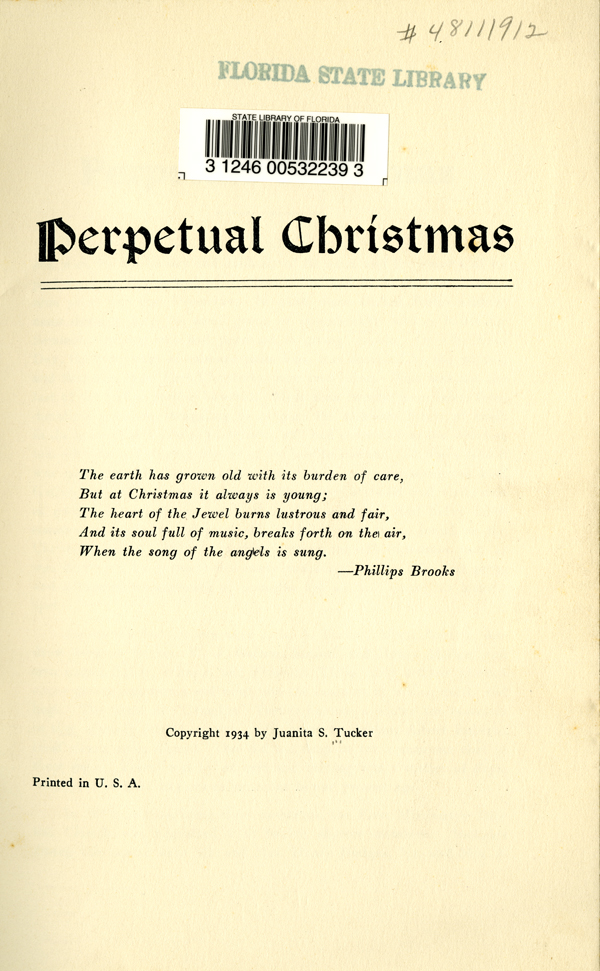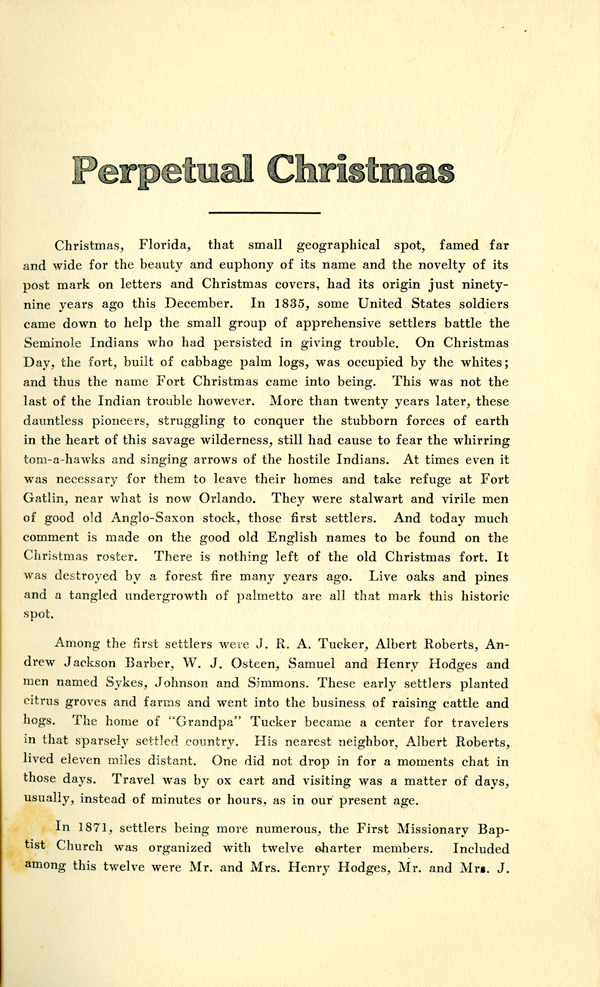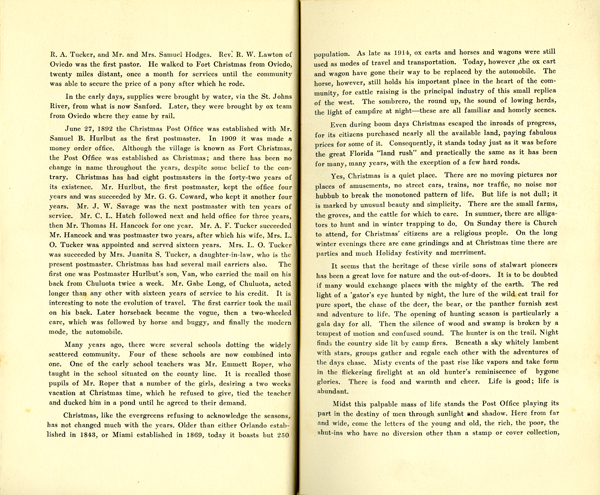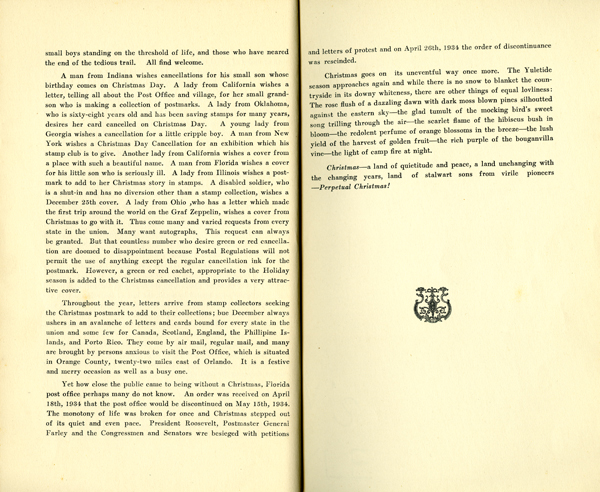Transcript
Perpetual Christmas
BY
JUANITA S. TUCKER
Perpetual Christmas
The earth has grown old with its burden of care,
But at Christmas it always is young;
The heart of the Jewel burns lustrous and fair
And its soul full of music, breaks forth on the air,
When the song of the angels is sung.
-Phillips Brooks
Copyright 1934 by Juanita S. Tucker
Printed in U.S.A.
Perpetual Christmas
Christmas, Florida, that small geographical spot, famed far and wide for the beauty and euphony of its name and the novelty of its post mark on letters and Christmas covers, had its origin just ninety-nine years ago this December. In 1835, some United States soldiers came down to help the small group of apprehensive settlers battle the Seminole Indians who had persisted in giving trouble. On Christmas Day, the fort, built of cabbage palms logs, was occupied by the whites; and thus the name Fort Christmas came into being. This was not the last of the Indian trouble however. More than twenty years later, these dauntless pioneers, struggling to conquer the stubborn forces of earth in the heart of this savage wilderness, still had cause to fear the whirring tom-a-hawks and singing arrows of the hostile Indians. At times even it was necessary for them to leave their homes and take refuge at Fort Gatlin, near what is now Orlando. They were stalwart and virile men of good old Anglo-Saxon stock, those first settlers. And today much comment is made on the good old English names to be found on the Christmas roster. There is nothing left of the old Christmas fort. It was destroyed by a forest fire many years ago. Live oaks and pines and a tangled undergrowth of palmetto are all that mark this historic spot.
Among the first settlers were J.R.A. Tucker, Albert Roberts, Andrew Jackson Barber, W.J. Osteen, Samuel and Henry Hodges and men named Sykes, Johnson and Simmons. These early settlers planted citrus groves and farms and went into the business of raising cattle and hogs. The home of "Grandpa" Tucker became a center for travelers in that sparsely settled country. His nearest neighbor, Albert Roberts, lived eleven miles distant. One did not drop in for a moments chat in those days. Travel was by ox cart and visiting was a matter of days, usually, instead of minutes or hours, as in our present age.
In 1871, settlers being more numerous, the First Missionary Baptist Church was organized with twelve charter members. Included among this twelve were Mr. and Mrs. Henry Hodges, Mr. and Mrs. J.
R.A. Tucker, and Mr. and Mrs. Samuel Hodges. Rev. R.W. Lawton of Oviedo was the first pastor. He walked to Fort Christmas from Oviedo, twenty miles distant, once a month for services until the community was able to secure the price of a pony after which he rode.
In the early days, supplies were brought by water, via the St. Johns River, from what is now Sanford. later they were brought by ox team from Oviedo where they came by rail.
June 27, 1892 the Christmas Post Office was established with Mr. Samuel B. Hurlbut as the first postmaster. In 1909 it was made a money order office. Although the village is known as Fort Christmas, the Post office was established as Christmas; and there has been no change in the name throughout the years, despite some belief to the contrary. Christmas has had eight postmasters in the forty-two years of its existence. Mr. Hurlbut, the first postmaster, kept the office four years. and was succeeded by Mr. G.G. Coward, who kept it another four years. Mr. J.W. Savage was the next postmaster with ten years of service. Mr. C.L. Hatch followed next and held office for three years, then Mr. Thomas H. Hancock for one year. Mr. A.F. Tucker succeeded Mr. Hancock and was postmaster two years, after which his wife, Mrs. L.O. Tucker was succeeded by Mrs. Juanita S. Tucker, a daughter-in-law, who is the present postmaster. Christmas has had several mail carriers also. The first one was Postmaster Hurlbut's son, Van, who carried the mail on his back from Chuluota twice a week. Mr. Gabe Long, of Chuluota, acted longer than any other with sixteen years of service to his credit. It is interesting to note the evolution of travel. The first carrier took the mail on his back. Later horseback became the vogue, then a two-wheeled care, which was followed by horse and buggy, and finally the modern mode, the automobile.
Many years ago, there were several schools dotting the widely scattered community. Four of these schools are now combined into one. One of the early schools are now combined into one. One of the early school teachers was Mr. Emmett Roper, who taught in the school situated on the county line. It is recalled those pupils of Mr. Roper that a number of the girls, desiring a two weeks vacation at Christmas time, which he refused to give, tied the teacher and ducked him in a pond until he agreed to their demand.
Christmas, like the evergreens refusing to acknowledge the seasons, has not changed much with the years. Older than either Orlando established in 1843, or Miami established in 1869, today it boasts but 250
population. As late as 1914, ox carts and horses and wagons were still used as modes of travel and transportation. Today, however, the ox cart and wagon have gone their way to be replaced by the automobile. The horse, however, still holds his important place in the heart of the community, for cattle raising is the principal industry of this small replica of the west. The sombrero, the round up, the sound of lowing herds, the light of campfire at night - these are all familiar and homely scenes.
Even during boom days Christmas escaped the inroads of progress, for its citizens purchased nearly all the available land, paying fabulous prices for some of it. Consequently, it stands today just as it was before the great Florida "land rush" and practically the same as it has been for many many years, with the exception of a few hard roads.
Yes, Christmas is a quiet place. There are no moving pictures nor places of amusements, no street cars, trains, nor traffic, no noise nor hubbub to break the monotoned pattern of life. But life is not dull; it is marked by unusual beauty and simplicity. There are the small farms, the groves, and the cattle for which to care. In summer, there are alligators to hunt and in winter trapping to do. On Sunday there is Church to attend, for Christmas' citizens are a religious people. On the long winter evenings there are cane grindings and at Christmas time there are parties and much Holiday festivity and merriment.
It seems that the heritage of these virile sons of stalwart pioneers has been a great love for nature and the out-of-doors. It is to be doubted if many would exchange places with the mighty of the earth. The red light of a 'gator's eye hunted by night, the lure of the wild cat trail for pure sport, the chase of the deer, the bear, or the panther furnish zest and adventure to life. The opening of hunting season is particularly a gala day for all. Then the silence of wood and swamp is broken by a tempest of motion and confused sound. The hunter is on the trail. Night finds the country side lit by camp fires. Beneath a sky whitely lambent with stars, group gather and regale each other with the adventures of the days chase. Misty events of the past rise like vapors and take form in the flickering firelight at an old hunter's reminiscence of bygone glories. There is food and warmth and cheer. Life is good; life is abundant.
Midst this palpable mass of life stands the Post Office playing its part in the destiny of men through sunlight and shadow. Here from far and wide, come the letters of the young and old, the rich, the poor, the shut-ins who have no diversion other than a stamp or cover collection,
small boys standing on the threshold of life, and those who have neared the end of the tedious trail. All find welcome.
A man from Indian wishes cancellations for his small son whose birthday comes on Christmas Day. A lady from California wishes a letter, telling him about the Post Office and village, for her small grandson who is making a collection of postmarks. A lady from Oklahoma, who is sixty-eight years old and has been saving stamps for many years, desires her card cancellation on Christmas Day. A young lady from Georgia wishes a cancellation for a little cripple boy. A man from New York wishes a Christmas Day Cancellation for an exhibition which his stamp club is to give. Another lady from California wishes a cover from a place with such a beautiful name. A man from Florida wishes a cover for his little son who is seriously ill. A lady from Illinois wishes a postmark to add to her Christmas story stamps. A disabled soldier, who is a shut-in and has no diversion other than a stamp collection, wishes a December 25th cover. A lady from Ohio, who has a letter which made the first trip around the world on the Graz Zeppelin, wishes a cover from Christmas to go with it. Thus come many and varied request can always be granted. But that countless number who desire green or red cancellations are doomed to disappointment because Postal Regulations will not permit the use of anything except the regular cancellation ink for the postmark. However, a green or red cachet, appropriate to the Holiday season is added to the Christmas cancellation and provides a very attractive cover.
Throughout the year, letters arrive from stamp collectors seeking the Christmas postmark to add to their collections; bue December always ushers in an avalanche of letters and cards bound for every state in the union and some few for Canada, Scotland, England, the Philipine Islands, and Porto Rico. They come by air mail, regular mail, and many are brought by persons anxious to visit the Post Office, which is situated in Orange County, twenty-two miles east of Orlando. It is a festive and merry occasion as well as a busy one.
Yet how close the public came to being without a Christmas, Florida post office perhaps many do not know. An order was received on April 18th, 1934 that the post office would be discounted on May 15th, 1934. The monotony of life was broken for once and Christmas stepped out of its quiet and even pace. President Roosevelt, Postmaster General Farley and Congressmen and Senators were besieged with petitions
and letters of protest and on April 26th, 1934 the order of discontinuance was rescinded.
Christmas goes on it uneventful way once more. The Yuletide season approaches again and while there is no snow to blanket the countryside in its downy whiteness, there are other things of equal lovliness: The rose flush of a dazzling dawn with dark moss blown pines silhouetted against the eastern sky -the glad tumult of the mocking bird's sweet song trilling through the air -the scarlet flame of the hibiscus bush in bloom -the redolent perfume of orange blossoms in the breeze -the lush yield of the harvest of golden fruit -the rich purple of the bouganvilla vine -the light of camp fire at night.
Christmas -a land of quietitude and peace, a land unchanging with the changing years, land of stalwart sons from virile pioneers -Perpetual Christmas!

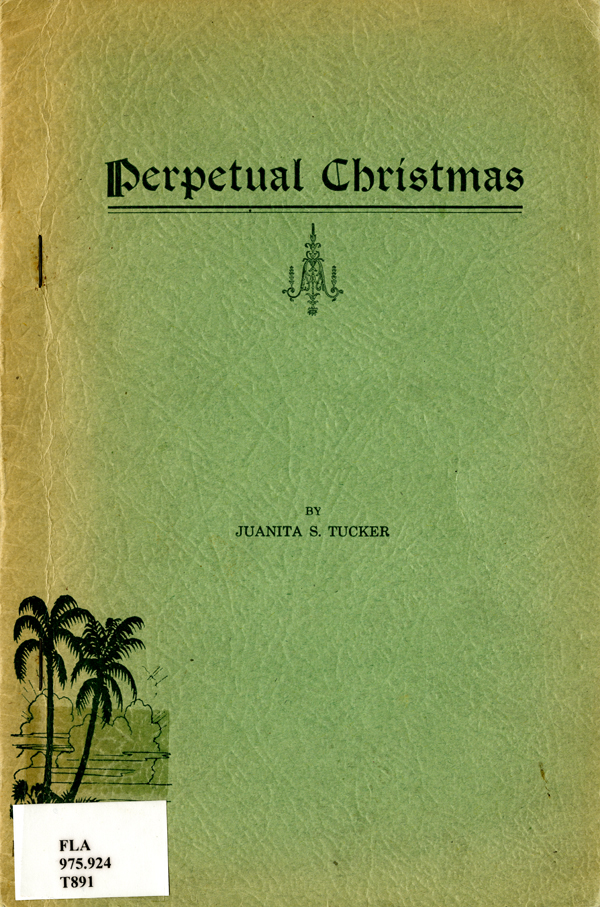


 Listen: The Latin Program
Listen: The Latin Program